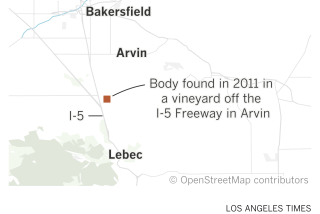Reiner to Use DNA Evidence Technique in Murder Case
- Share via
PASADENA — Los Angeles County Dist. Atty. Ira Reiner announced plans Wednesday to use a revolutionary forensic technique called genetic fingerprinting to prosecute two suspects in the rape and murder of a Pasadena woman last fall.
The technique, which was developed four years ago in England, involves matching the genetic makeup of a suspect with blood or semen samples found at a crime scene.
Although it has been used in 13 states, the prosecution of Ronald Anthony Jones and George Marvin Trone Jr. will be the first court use of the technique in the county, and possibly the state.
The preliminary hearing in the case involving the murder of 26-year-old Lois Haro is scheduled to begin March 21 in Pasadena Superior Court. Jones and Trone have pleaded not guilty.
“Some have said genetic fingerprinting is the most important advance in 100 years,” Reiner said. “Indeed, it may be the most important advance period.”
Haro’s partially clad body was discovered by police last October next to a road near the Rose Bowl.
She had left her home earlier that day to go shopping at the Plaza Pasadena Mall. According to police, the woman was kidnapped, raped and then shot in the head.
The day after her body was found, a Police Department employee saw a car that matched a description of Haro’s missing vehicle. He followed the car to a parking lot.
Officers arrested Jones at a residence nearby and Trone was arrested that evening.
Semen from the crime scene and blood samples from the two suspects were sent for genetic testing to Lifecodes Corp., a New York company that is one of three private laboratories in the country doing genetic fingerprinting.
The tests analyzed DNA, or deoxyribonucleic acid, extracted from the samples. DNA, which is found in all cells, carries each individual’s genetic blueprint and determines everything from hair color to sex. Each individual’s genetic code is unique, except in the case of identical twins.
The tests concluded that the genetic patterns found in the semen and blood samples were almost perfect matches for both defendants. Lifecodes put the odds of another person matching the genetic fingerprint of the semen sample at up to 1 in 272 billion.
He said the Haro case was chosen as the test case because of the conclusiveness of the genetic tests and the availability of other evidence that would allow a successful prosecution of the suspects without genetic evidence.
Reiner added that the case was also chosen because it is a death penalty case and will probably be reviewed by the appellate court.
Reiner said the district attorney’s office has been considering the use of genetic fingerprinting for more than a year but has waited for the technique to gain wider forensic acceptance.
Whether that has been achieved will be argued at the hearing March 21.
Gerald Peterson, Jones’ defense attorney, said that despite the use of the technique in other states, he questions whether it will pass California’s so-called Kelly-Frye test, which requires proof that is reliable, verifiable and accepted by the scientific community before it can be admitted in court.
“We definitely intend to challenge it,” he said. “The technique is still open to doubt.”
There are two other cases pending in the state in which genetic evidence is to be introduced.
In Orange County, a preliminary hearing is expected to begin in June for Danny Harris, who is charged with 63 counts of rape. Harris, 37, is suspected of raping at least 18 women in Anaheim, Fullerton, Santa Ana and Garden Grove dating back to December, 1985.
In Ventura County, a hearing is set to begin March 20 in a murder case in which genetic evidence will be presented by the prosecution.
More to Read
Sign up for Essential California
The most important California stories and recommendations in your inbox every morning.
You may occasionally receive promotional content from the Los Angeles Times.














